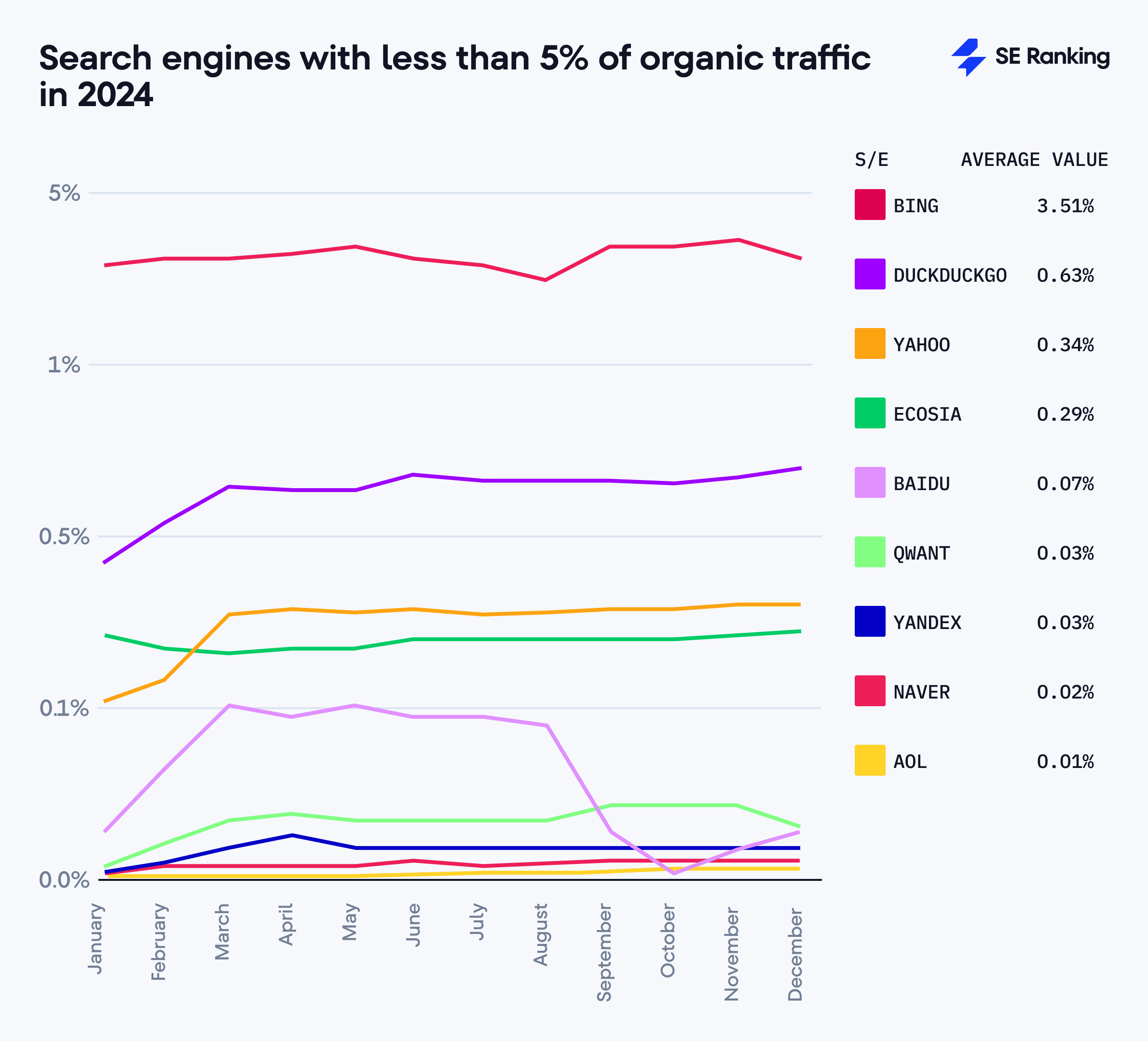Law Firms Can’t Rely on Google Alone as AI Search Gains Traction
Posted on Tuesday, February 11th, 2025 at 6:37 pm
Google Still Reigns, But Its Grip Is Loosening
For years, Google has been the default gateway to the internet. When people needed answers, they turned to Google without a second thought. Businesses—including law firms—built their entire online strategies around ranking high in Google’s search results, knowing that’s where the vast majority of potential clients would look.
2025 is showing the first signs that this is about to change. While Google still generates 94.8% of organic search traffic, recent data shows its market share is slowly starting to slip. Other search engines and AI-powered platforms are pulling users away, revealing that Google’s dominance is no longer untouchable.
This decline is happening despite Google’s heavy investment in artificial intelligence. As we recently discussed in our breakdown of Google’s Q4 earnings, Google’s total revenue for Q4 2024 reached $86.3 billion, a 13% increase from the previous year. But while AI is boosting revenue, it isn’t strengthening Google’s market share in search. Several AI-powered tools are sending more referral traffic to websites than ever, forming a new pattern in how users search for information. Additionally, alternative search engines like Bing, DuckDuckGo and Yahoo are gaining traction as displayed in the chart below.
Read more in our analysis of ChatGPT’s rise in search.

For law firms, this shift raises an important question: What can you do as more potential clients seek legal help outside of Google?
AI-Powered Search Is Disrupting Traditional Search
For years, search engines have operated the same way: users type in a query, browse through results, and click on a website for answers. AI search tools are disrupting this traditional process by delivering conversational responses directly without requiring users to click through multiple websites. These AI-driven models function more like digital assistants than traditional search engines. They summarize information, provide context, and can even generate insights on legal topics—bypassing the process of clicking through to the “blue link” organic results.
For law firms, this shift raises important questions about their online visibility. If potential clients are getting legal information from AI tools instead of clicking through to law firm websites, firms will need to rethink how they position themselves in the digital space. We’re continuously monitoring developments in this search behavior trend, and while there isn’t a playbook to get your law firm to appear in alternative AI search engines, there are some proactive steps attorneys can take to build an SEO foundation for this new era of search. Below are some of the top action items lawyers can implement for AI-powered online searches:
- SEO advice for AI Overviews from a Google Senior Search Analyst
- Restructuring and optimizing website content for Voice search
The bottom line: Google is still the dominant force in search, but AI-powered alternatives are reshaping how information is found and consumed, and search engine marketing strategies need to adapt accordingly.
Other Search Engines Are Gaining Ground
Recent data shows that smaller competitors are making progress in the world of Search. Bing, in particular, has seen steady growth in its share of organic search traffic. Bing accounted for an average of 3.51% of organic traffic per month, with its share increasing by 0.17% over the year. Bing is now the second most popular search engine in the US. While still far behind Google, it continues to pull in more users, demonstrating that search habits are changing.
This trend is partly driven by AI advancements. Microsoft has integrated OpenAI’s models into Bing, giving users AI-assisted search capabilities that differentiate it from Google. As AI-driven search becomes more common, platforms like Bing may continue to attract users looking for an alternative to Google’s traditional results.
Read More: Search engines to consider as Google faces an uncertain future and an antitrust lawsuit
For law firms, this slow but steady change matters. Many firms have focused their marketing almost exclusively on Google, assuming that’s where all potential clients search. But if Bing and other search engines continue growing, firms that optimize for multiple platforms may have an advantage. Even a small increase in visibility outside of Google could mean more leads and new clients.

Stay Competitive With TSEG
Google’s search dominance isn’t disappearing overnight, but the way people find information online is undoubtedly changing. AI-powered search, alternative platforms, and overall user behavior are already reshaping digital marketing. Law firms that don’t adjust may find themselves losing visibility to competitors in ways they didn’t expect.
At TSEG, we track these changes closely to help law firms stay competitive. Whether it’s optimizing for AI-driven referrals, expanding beyond Google, or refining content strategies to reach the right clients, we focus on real strategies that drive growth.
Firms that rely too heavily on Google alone could be missing opportunities. If you want to make sure your firm is positioned for long-term success, now is the time to adapt. Contact us today.
